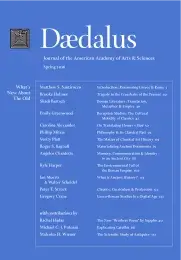Tragedy in the Crosshairs of the Present
A number of developments in the study of Greek literature over the past few decades have broken down boundaries of canon and genre, opening up a wide range of texts once deemed degenerate or unavailable to literary analysis, expanding the networks within which literary texts are interpreted, and bringing renewed attention to the reception of ancient texts in later periods up to the present. The rise of reception studies, in particular, raises new questions about how our own position within specific present moments not only imposes constraints on the interpretation of ancient texts but also enables it. In this essay, I survey these developments using Greek tragedy, the most canonical of genres, as a case study. I argue that we need to develop strategies of interpretation more attuned to resonances between contemporary quandaries and our extant tragedies while remaining committed to forms of social and historical difference. I pay particular attention to the problems of agency that tragedy raises at the juncture of the human and the nonhuman worlds.
The category of “Greek literature” has been nothing if not contestable for some decades now. The challenges have come largely from a cluster of approaches usually referred to as “cultural poetics” or “cultural history,” whose driving assumption is that determining the meaning of any ancient text requires that we embed it within a larger network of power and a broader field of signs (Athenian democracy, for example, or archaic song culture, or pan-Hellenic politics). The impact of cultural poetics has been enormous. As canonical “literary” texts have been released into a wider cultural stream, once-marginal texts have become newly privileged objects of attention. The study of texts produced after the fall of classical Athens in Ptolemaic Alexandria and under the Roman Empire, texts long dismissed as imitative and degenerate, has been booming since the mid-1990s. Decades of groundbreaking work on gender and sexuality have also helped to broaden the corpus of texts, encouraging a shift of attention toward medical and other technical texts, in particular. Alongside these developments we have witnessed the rapid ascent of a subfield usually called “reception studies,” roughly the study of classical antiquity in post-antique societies and the history of classical scholarship. The field of Greek literature, in short, has been blown open. Its boundaries–generic, geographical, chronological–are no longer easily locatable. . . .
